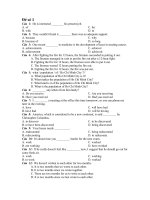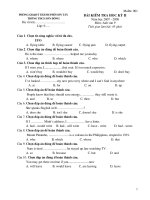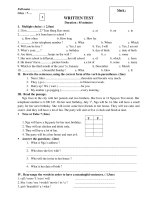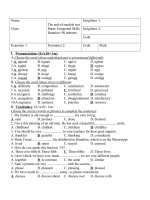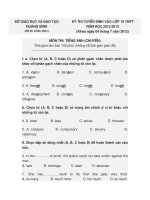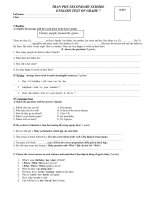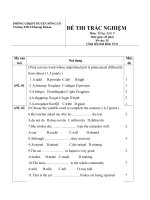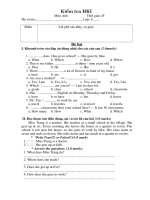De Tieng Anh 2012
Bạn đang xem bản rút gọn của tài liệu. Xem và tải ngay bản đầy đủ của tài liệu tại đây (114.09 KB, 4 trang )
<span class='text_page_counter'>(1)</span>UNIT 4: SPECIAL EDUCATION PART 1: GRAMMAR A. “THE + ADJECTIVE” ( THE + TÍNH TỪ ) Ta có thể thành lập danh từ tập hợp bằng cách thêm “ The” trước tính từ. Nó được dùng để chỉ một nhóm hay một giới và có nghĩa số nhiều. vì vậy, động từ theo sau “ the + adjective” phải được dùng ở hình thức số nhiều. Ex: rich ( adj ): giàu the rich ( noun): những người giàu. - The rich are not always happy. - The sick are taken care of by the doctors. * Các tính từ sau đây thường được dùng với dạng “ the + adjective” poor ( adj ): nghèo the poor ( n): những người nghèo rich ( adj ): giàu the rich ( n ): những người giàu sick ( adj ): ốm (đau): the sick ( n ): những người ốm unemployed ( adj ): thất nghiệp the unemployed ( n ): những người thất nghiệp injured ( adj ): bị thương the injured ( n ): những người bị thương young ( adj ): trẻ the young ( n ): những người trẻ old ( adj ): già the old ( n ): những người già homeless ( adj ): vô gia cư the homeless ( n ): những người vô gia cư blind ( adj ): mù the blind ( n ): những người mù deaf ( adj ): điếc the deaf ( n ): những người điếc dumb / mute ( adj ): câm the dumb / mute ( n): những người câm disabled ( adj ): tàn tật the disabled ( n): những người tàn tật dead ( adj ): chết the dead ( n ): những người đã chết elderly ( adj ): lớn tuổi the elderly ( n): những người lớn tuổi wrong ( adj ): sai trái the wrong ( n): những điều sai trái right ( adj ): đúng, đúng đắn the right ( n ): những điều đúng đắn * Chúng ta cũng có thể dùng “ the” trước một số từ chỉ quốc tịch để nói chung tất cả người thuộc quốc tịch đó. Động từ theo sau “ the + quốc tịch” được dùng ở số nhiều. Eg: The English are normally fond of drinking tea. (The English = người Anh nói chung ) * Các từ chỉ quốc tịch dùng với “ the” tận cùng thường có mẫu tự “ -sh”, “-ch”, hoặc “ –ese” như: the English, the British : người Anh the Spanish : người Tây Ban Nha the French : người Pháp the Chinese : người Trung Quốc B. USED TO: I. FORM: S + USED TO + bare inf. = ĐÃ TỪNG S + DIDN’T + USE TO + bare inf. = ĐÃ TỪNG KHÔNG DID + S + USE TO + bare inf. = CÓ TỪNG ……..KHÔNG? II. USE: “ Used to + nguyên mẫu” dùng để nói về thói quen hay việc thường làm trong quá khứ mà nay không còn nữa. Eg: I used to cry when I was a child. My father didn’t use to do morning exercise when he was young. Did your brother use to work in the bank? C.WHICH AS A CONNECTOR ( Which dùng như từ nối) Eg: _ Tom was late. That surprised me. Tom was late, which surprised me. Which được dùng để thay thế cho một mệnh đề đứng trước nó. Note: Khi “ which” thay thế cho mệnh đề đứng trước nó, phải có một dấu phẩy ngăn cách giữa “ which” với mệnh đề đó..
<span class='text_page_counter'>(2)</span> PART 2: BÀI TẬP THỰC HÀNH Exercise 1: What do we call these people? Use “ the + adjective”. 1. people who cannot see _______________ 2. People who have no jobs _______________ 3. People who are unwell _______________ 4. People who are unable to hear _______________ 5. People who are no longer alive _______________ 6. people who have no home _______________ Exercise 2: Complete the sentences using “ the” + one of the following adjectives: young rich unemployed poor injured blind sick old 1. Right after the accident, ......................... were taken to the hospital by ambulance. 2. ....................often think of themselves as being wise and experienced 3. .................... have the future in their hands. 4. A nurse’s job is taking care of .......................... 5. Some people think that..........................should pay more taxes to help ................... 6. Life is all right if you have a job, but things are not easy for ................................... 7. Braille is a system of printing that enable .......................... to read. Exercise 3: complete each sentence using “ used to” or “ didn’t use to” + one of the following verbs. like ( not ) like go ( not ) get up travel be ( not ) drink have 1. Mary................................a lot when she was single. These days she doesn’t take many trips 2. My uncle’s family.................................in Dalat. Now they live in Nha trang city. 3. You....................................................coffee before. Now you drink it a lot. 4. Mai..............................................very long hair when she was a schoolgirl. 5. This building is now a restaurant. It............................a theater years ago. 6. Bruno..................................Vietnamese food, but now he often eats it. 7. Now I normally go to bed at about 9 o’clock, but I.................................to sleep much later before. 8. When Nam first worked on a farm, he...............................................at 5.00 in the morning. Exercise 4: Combine two sentences into one, using the connector “ which” 1. Max isn’t home yet. That worries me. Max isn’t home yet, which worries me. 2. Jack was fired from his job. That surprised all of his co-workers. ................................................................................................................... 3. My roommate never picks up after herself. This irritates me. ................................................................................................................... 4. Mrs. Anderson responded to my letter right away. I appreciated that very much .................................................................................................................................. 5. There was an accident on Highway. That means I’ll be late to work this morning. .................................................................................................................................... 6. I shut the car door on my necktie. That was really stupid of me. .................................................................................................................................... Exercise 5: Choose the one word or phrase A, B, C or D that best completes the sentence or substitutes for the underlined word or phrase. 1. For most of these children, poverty........................them from having enough schooling A. makes B. avoids C. prevents D. refuses 2. Miss Thuy enjoys teaching her students, some of which are..................retarded. A. mental B. mentally C. mention D. mentality 3. In such an unusual class, the teacher had to make great.............to help the students. A. tries B. jobs C. efforts D. powers 4. This work is very .................., so you can’t expect it to be completed in two or three days. A. timing B. time – consuming C. lengthening D. time – using 5. Her students are not normal. In fact, they are....................children. A. unreal B. discarded C. dislike D. disabled 6. It seemed very difficult at first, but she .................earned the trust from the children’s parents..
<span class='text_page_counter'>(3)</span> A. hardly B. never C. readily D. gradually 7. All of the children who....................Miss Thuy’s class were deaf and dumb. A. came B. attended C. went D. were present 8. Most of the children are...................by the animals at the circus. A. fascinating B. fascination C. fascinate D. fascinated 9. Some of the more time-consuming jobs can now be done by machines. A. taking much time B. taking little time C. odd D. not affected by time 10. I have been fascinated by..................since I was at secondary school. A. photograph B. photographic C. photographer D. photography 11. He has not developed mentally as much as others at the same age. He’s...............child. A. mentally ill B. mentally retarded C. mentally alert D. mentally restricted 12. He invented a new kind of wheelchair for the ............... A. unemployed B. poor C. disable D. unhappy 13. She displayed some of her paintings at the local........................ A. commune B. post office C. demonstration D. exhibition 14. He earns his living by taking photographs. He’s a / an .............photographer. A. amateur B. professional C. talent D. determined 15. In spite of her deafness, she played the violin very well. A. inability to speak B. inability to see C. inability to hear D. mentally impairment 16. The government is doing nothing to help..................... A. the poor people B. the poor ones C. the poor D. the poors 17. It rained all the time, .................was a great pity. A. that B. what C. which D. who 18. Claude didn’t ....................in Canada A. lived B. use to live C. used to live D. used to living 19. I remember you. You.................to school here. A. were used to going B. have already gone C. went D. used to go 20. I didn’t like the noise in the city at first. But now......................here. A. I got used to living B. I’m used to living C. I used to live D. I used to living A. MULTIPLE CHOICES: I/ Choose the word whose underlined part has a different pronunciation from the others in each group: 1/ A. special B. parent C. mental D. very 2/ A. every B. easy C. why D. gradually 3/ A. provide B. primary C. si gn D. provi nce 4/ A. difficu lt B. commu ne C. running D. su ffer 5/ A. realize B. teacher C. rea son D. feature 6/ A. action B. fourteen C. inst ead D. active 7/ A. acted B. jogged C. retarded D. sacred 8/ A. dumb B. rob C. b ook D. b ring 9/ A. education B. question C. examination D. attraction 10/ A. w rong B. w ord C. west D. with II/ Choose the word whose main stress is placed differently from the others in each group: 1/ A. education B. specialty C. opposition D. demonstration 2/ A. special B. mental C. fourteen D. within 3/ A. luggage B. retard C. happen D. lesson 4/ A. subtract B. parent C. message D. passage 5/ A. disable B. manager C. condition D. parental 6/ A. sorry B. happy C. commune D. subject 7/ A. instead B. welcome C. construct D. arrive 8/ A. primary B. everything C. afternoon D. exciting 9/ A. province B. prepare C. finger D. meeting 10/ A. better B. standing C. attend D. open.
<span class='text_page_counter'>(4)</span> Read the passage below carefully, and then decide whether the statements are true (T), false (F) or not given (N): Education of students who are hard of hearing or deaf may involve the use of powerful amplification devices, such as hearing aids, or it may use captions (printed words that appear on a television screen or computer monitor). Many deaf or hard of hearing students learn sign language, an organized system of gestures for communication. Others learn to speechread (lipread), a method of interpreting speech by “reading” the patterns of a person’s mouth as he or she speaks. Some deaf students receive cochlear implants, which are receivers surgically implanted behind the ear and connected to electrodes placed in the cochlea of the inner ear, enabling individuals to hear sounds to a varying degree. Gifted children are often moved through the regular school curriculum at a faster pace than their peers. Some children with exceptionally high ability in a particular subject area may be allowed to reduce the time they spend in their other subjects to permit more time to focus on challenging content in their specialty. A high school student who is particularly gifted in math, for example, may attend advanced math classes at a local college rather than music classes at the high school. Some gifted students may also skip grades or they may enter kindergarten, high school, or college at an early age. 1/ Hearing aid is a device worn inside or next to the ear by people who cannot hear well in order to help them to hear better. 2/ Just few deaf or hard of hearing students learn sign language. 3/ Several dumb students receive cochlear implants. 4/ The first paragraph is about deaf and hard of hearing students. 5/ There are many deaf students in the United States of America. 6/ Gifted children often find it easier to move through the regular school curriculum at a faster pace than their friends. 7/ All the children have to spend equal time in their study in these schools. 8/ A gifted high school student may attend any classes at a local college that he or she wants to. 9/ Education in foreign countries is very good. 10/ The second paragraph is about gifted students..
<span class='text_page_counter'>(5)</span>
